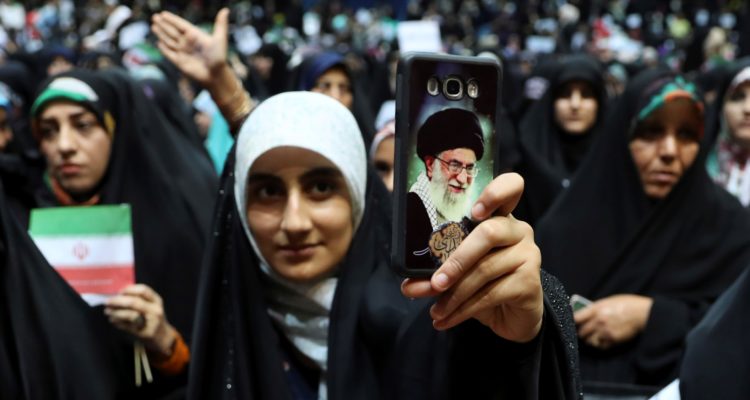Out of 592 individuals who registered to run as candidates in the Iranian regime’s 13th presidential election, the unelected Guardian Council only approved seven individuals to run for the presidency.
By Majid Rafizadeh, Gatestone Institute
Iran’s presidential “elections” will be held in less than three weeks. Do not, however, be deceived by any narrative that suggests the mullahs’ system is democratic or that the people of Iran freely or fairly get to elect their president.
Iran’s mullahs claim that the Islamic Republic is a “democratic” system of governance. Iran’s Supreme Leader recently boasted about the Islamic “democracy,” the regime’s political system and people’s crucial role in influencing and shaping the political establishment:
“The Islamic Revolution transformed the rule of a country from a despotic monarchy into a popular, democratic republic run by the people. Today, the nation of Iran rules over its own destiny. It is the people who choose. They may make a right choice or a wrong choice, but it is they who choose. This is very important.”
In reality, though, the Iran is an authoritarian, theocratic regime masquerading as a democracy. The ordinary people of Iran do not run the system and have no influence whatsoever in choosing who will be their leaders.
To clarify, let us begin with the top position in the Islamic Republic: the Supreme Leader. The Supreme Leader of Iran is not elected. This position is held by an ayatollah who enjoys the final say in the nation’s domestic and foreign policy issues; who is the chief of Iran’s military institutions including the Islamic Revolutionary Guard Corps (IRGC), its elite branch the Quds Force and the paramilitary group Basij, and who also appoints the IRGC’s senior cadre and generals and the head of the judicial system.
Next in line are the positions of the president and members of the parliament (Majlis) in the Iranian regime. The President of the Islamic Republic basically does not have power. He acts as a puppet for the Supreme Leader and the IRGC, and facilitates their achieving their parochial and ideological goals, both regionally and internationally. One example, for instance, is the 2015 nuclear deal that the Iranian president reached with the U.S. Obama administration and getting sanctions lifted for the Iranian regime.
When it comes to the positions of the president and the parliamentarians in Iran, Article 16 of the Constitution of the Islamic Republic stipulates:
“In the Islamic Republic of Iran, the country’s affairs must be administered by reliance on the public vote, and through elections. These will include the election of the president, the deputies of the Islamic Consultative Assembly (Majlis), the members of the councils, and other such institutions, or through a referendum in such instances as are determined in other articles of this document.”
The Iranian regime, however, has incorporated another article in its Islamic constitution that basically diminishes the power of people’s vote. Article 9 of the Islamic Republic’s constitution states:
“The qualifications of the candidates for presidency, with respect to the conditions set forth by the constitution, must be confirmed by the Guardian Council prior to the general elections and approved by the leader for the first term”.
The Guardian Council is an unelected body made of 12 unelected members who are appointed directly (six members) or indirectly by the Supreme Leader, Ayatollah Ali Khamenei. The other six members are nominated by the head of judiciary who, in return, is appointed by the Supreme Leader.
The unelected Guardian Council has a history of arbitrarily disqualifying reform-minded candidates, women and those who are perceived as disloyal to the principles of the state and the Islamic revolution, from running for office.
As a result, the so-called democratic elections of the Iranian regime come down to the Iranian people getting to vote only on a few individuals who have already been selected and approved by the regime’s mullahs. Out of 592 individuals who registered to run as candidates in the Iranian regime’s 13th presidential election, the unelected Guardian Council only approved seven individuals to run for the presidency.
Nevertheless, with a straight face, Ayatollah Khamenei pointed out on May 2:
“All elections held by the Islamic Republic have been totally flawless. There might have been certain issues and offenses, but none of them had a significant impact on the result of elections. Those who raise fraud claims do so because of being defeated.”
Of course, for the ayatollah, the elections are “flawless” because his regime gets to pick who runs.
Instead of condemning the mullahs for this charade of fake elections, the Biden administration — after feathering the nests of American enemies such as Russia and China — continues to try to make a deal that will not be kept, shower Iran’s regime with masses of money it demands from America’s hard-working taxpayers, and lift sanctions to further empower yet another corrupt and predatory regime.
Dr. Majid Rafizadeh is a business strategist and advisor, Harvard-educated scholar, political scientist, board member of Harvard International Review, and president of the International American Council on the Middle East. He has authored several books on Islam and U.S. foreign policy. He can be reached at Dr.Rafizadeh@Post.Harvard.Edu





